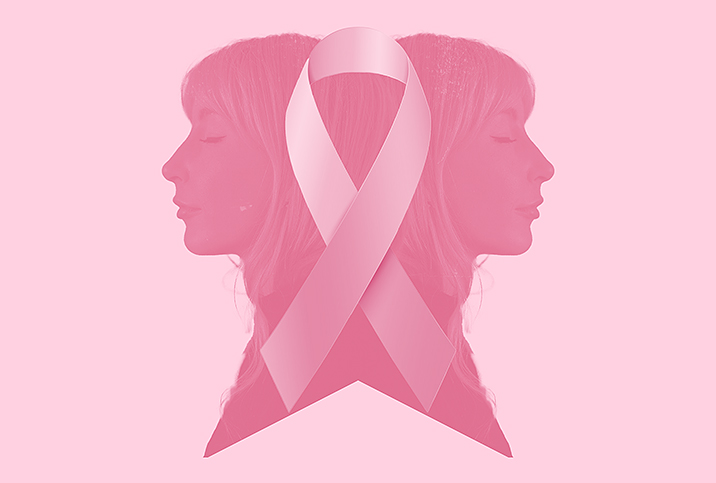Raising Awareness: Breast Cancer Alliance Funds Scientific Advances

Breast cancer is the most common type of cancer for women in the United States after skin cancers, with the average risk at 13 percent—meaning women have a 1 in 8 chance of developing the disease.
The American Cancer Society estimates this year, about 281,550 women will be diagnosed with invasive breast cancer and about 49,290 will be diagnosed with ductal carcinoma in situ (DCIS), which is an early-stage (or “stage 0”), non-invasive form. About 43,600 women will die from breast cancer in 2021. It is the second leading cause of cancer death for women.
Fortunately, from 2013 to 2018, the death rate has steadily declined by 1 percent each year. Scientists believe this is due to earlier detection through screening, increased awareness and advances in treatment.
To learn more about these scientific breakthroughs, we spoke with Meg Russell, president of Breast Cancer Alliance, which helps fund early-stage breast cancer research.
In this exclusive Q&A with Giddy for Breast Cancer Awareness Month, Russell discusses the promising research being funded by BCA, the pandemic's impact on the organization, and the importance of specially-trained breast surgeons.
Tell us a bit about Breast Cancer Alliance
Breast Cancer Alliance was founded 25 years ago by a group of friends, one of whom was living with stage 4 breast cancer. From that first meeting around a kitchen table, the organization has grown over the years to one of the most prominent and highly-ranked national breast cancer charities.
Our mission is to improve survival rates and quality of life for those impacted by the disease by investing in early-stage innovative research, breast surgery fellowships, regional education, and breast cancer-related healthcare services for the underserved. That mission has never been more important than now, with so many barriers to care through the loss of jobs, and therefore health insurance, due to the pandemic.
How long have you been involved with BCA, and what's your background? What made you first interested in working in this field?
I have been involved with BCA for approximately seven years, beginning as a volunteer and, over the years, my involvement and responsibilities grew. I became a board member five years ago, joined our Executive Committee three years ago and have been president since April 2020.
My background was in the non-profit sector but with a different focus. Honestly, my initial involvement wasn't because of a passion for breast cancer research. As with most people, I had some friends and family who had been through breast cancer journeys, but my interest in getting more involved was truly how impressive BCA was, from the high rankings on Charity Navigator to the respect the organization received in the community and beyond.
What we are able to accomplish with a full-time staff of two, a few part-time employees, an active board, and scores of volunteers is nothing short of amazing.
What inspires you most about your job? What are some of the challenges?
I have to say that our site visits with our grantees are the most inspiring part of my job. We require that our grantees submit midterm and final reports and also host a site visit during the grant period so that our board and committee members can see the impact of our donations. Since the start of the pandemic, the site visits have been virtual and therefore very easy for anyone interested to attend.
To see the difference our grants are making in the day-to-day work of a patient navigator, for example, is so heartwarming. Our education and outreach grants are helping the underserved community, those with limited healthcare, with language barriers or simply those who are fearful of tests and potential results. Without these kinds of grants, breast cancer can easily go undetected or untreated.
As with most organizations, the COVID-19 pandemic took its toll on BCA. Raising funds for breast cancer research became much more challenging when everyone's focus was understandably elsewhere. However, breast cancer did not take a break during that time so we had to find creative ways to raise the funds we need to keep granting important work.
BCA focuses specifically on funding early-stage research. Why?
BCA is proud to be able to fund early-stage research. All too often, researchers will come up with a novel approach but cannot receive government funding without proof of concept because of how innovative their hypotheses are. We rely on a team of incredibly dedicated clinicians who review each grant request and guide us to select those with the most promising outcomes.
Our grants offer the bridge between novel research and the opportunity to generate preliminary results, which are needed to allow the researcher to apply for larger-scale government funding to continue their work. We often hear that our grants play a pivotal role in the advancement of their research, which is so gratifying, and in launching the careers of scientists just beginning their work in the field.
One of BCA's funding focuses is breast surgery fellowships at Society of Surgical Oncology-accredited institutions. How does having specially trained breast surgeons impact patients' survival rates and quality of life?
Surgeons who go on for the fellowship year in breast surgery not only receive elite training in the newest and most advanced surgical techniques, but they also participate in rotations in disciplines like radiology, oncology, pathology, genetics and more, plus some research in a particular area of focus.
As such, when a patient is seen by a specially-trained breast surgeon, especially those coming from SSO-accredited programs, they can be assured that their surgeon is best-suited to advise on the type and scope of surgery to remove the tumor, gain clear margins, leave minimal scarring and so on. With better technique, and less scarring, outcomes improve, as does quality of life.
What are some of the research initiatives BCA is currently working on?
We are currently funding many exciting research initiatives. For example, we were honored to fund Dr. Nora Disis' work toward developing a preventive vaccine for breast cancer. We are also very excited about Dr. Maria Soledad Sosa's work targeting disseminated breast cancer cells to prevent metastasis.
BCA highlighted Dr. Thomas O'Sullivan's work in our recent newsletter; Dr. O'Sullivan is using his background as an electrical engineer to develop wireless implants the size of "breast clips" to continuously monitor tumors and deliver localized and targeted treatment at optimal times. There are so many novel concepts out there and we are proud to be able to be part of their process.
October is Breast Cancer Awareness Month. What are some of the events BCA has planned and what goals would you like to see fulfilled this month, in your own sphere and in the bigger picture?
October is certainly a busy time in our world. We kicked off the month on October 1 with a ceremony during which we raise the Breast Cancer Alliance flag at Greenwich Town Hall, which included remarks by our Executive Director Yonni Wattenmaker, Greenwich's First Selectman Fred Camillo and two of our affiliated physicians.
We are partnering with many local and national retailers who are offering a percentage of their sales to BCA. In our community, we have supporters who are hosting shopping events at their homes or at workout locations, again with a portion of proceeds going back to the organization.
Most importantly, we are hosting our 25th Annual Luncheon and Fashion Show on October 20 with both an in-person and a live-stream celebration. This event will feature Hoda Kotb as a speaker, a performance by Julius Thomas III of Broadway's "Hamilton," a Michael Kors/ Richards fashion show and our grand finale, a fashion show featuring breast cancer survivors.
This Models of Inspiration fashion show is always the highlight and the heartbeat of the afternoon. In 2019, we hosted over 1,100 attendees. Our event in 2020 was virtual of course but we are excited to see many of our supporters in person later this month, as we honor the past-presidents of BCA.
Our goal is always to raise as much money as we can so we can continue to fund the excellent grant requests which come our way. Just as important, we want to continue to grow awareness of BCA, share how to prevent or treat the disease overall, and offer support to those who need it.
What advice would you give to someone who has just been diagnosed with breast cancer? What is the most important thing she can do right now?
If I knew someone who had just received a breast cancer diagnosis, I would send her/him to our website (breastcanceralliance.org) where we have a wealth of resources available. It's a one-stop shop for anyone who is overwhelmed with how best to proceed. We post up-to-date clinical trials and research, support services, ways to access potential disability benefits, nutritional guidance, diagnostic services, etc.
I would also recommend that they speak with a few different doctors before settling on one, as it is so important to have confidence in your doctor but also feel that they are accessible to you and will be comforting during your journey. Our Executive Director fields emails and calls like this often, happy to assist those in need however possible.
Lastly, I would suggest that they make sure they have a strong support system in place. A breast cancer diagnosis is a scary one and connections with friends and family will be crucial to rely upon at this time.
Do you have any final thoughts you'd like to share with our readers?
Thank you for the opportunity to share the work of Breast Cancer Alliance and at a time during the year when so much attention is focused on the disease. Having said that, it's important to remember that breast cancer diagnoses are given all year long, not just in October.
We want women to remember to get their annual mammograms, and we want men to know their family history and perform self-exams. We want patients to know they have a resource for guidance, and donors to know that if they make a gift to Breast Cancer Alliance, approximately 80% goes directly to the grants we fund.
Whether you live in New York or California [or anywhere in between], you can be involved with BCA, and as our community grows, so does our impact.


















